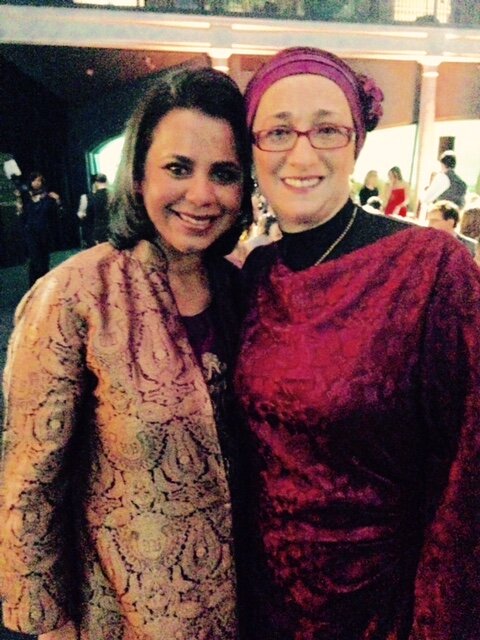You did not break me - Sabiha Husić
Today is the 20th anniversary of the massacre in Srebrenica, when more than 8,000 Muslim men and boys were killed by Bosnian Serb forces. Inna lillahi wa inna ilayhi raji’un (“Surely we belong to Allah, and to Him shall we return). It is unbearable to read accounts of the heinous crimes committed during the Bosnian war and genocide, including the use of rape as a weapon of war and ethnic cleansing. An estimated 20,000 to 50,000 Bosnian women were raped, in a targeted, systematic assault. Each a mother, a daughter, a sister, a wife.The depravity that human beings are capable of is beyond comprehension.The level of courage and compassion that they can rise to is what makes life go on.Sabiha Husić, from Bosnia-Herzegovina, has devoted her life to helping survivors of rape and other violence against women. She is an Islamic theologian, a psychotherapist, and Director of Medica Zenica, the first center to provide therapy and aid to women who were raped and traumatized in Bosnia. Most of the women who were raped were Muslim, and only ten percent have come forward to speak about their experiences, she says.Medica Zenica provides psychological counseling and other support to survivors of rape, domestic violence and other violence; and establishes networks with other NGOs that can also offer support. It has a safe house where women can stay; up to 22 women can live there. It provides women and girls vocational training, such as tailoring and hairdressing; workshops for rural women so they can recognize violence and know where to seek help; programs to empower women to become more active in social and political life; and a shelter for children victims of violence and those who live on the streets. There is also an SOS 24-hour hotline that women can call from anywhere in Bosnia-Herzegovina. In addition, the non-profit lobbies and advocates to keep pressure on the government to prioritize these issues and to implement international protocols. But much remains to be done, Sabiha says.“Twenty years after the war, we still have a lot of problems. For example survivors of sexual violence can see perpetrators on the street; perpetrators hold some positions in our communities or in our country. They need to be punished. We help and support survivors to provide testimony.”Sabiha’s goal is to ensure that all women, no matter where they live in Bosnia- Herzegovina, are granted the same rights. “In the Federation, it’s a better position, women can get health insurance and some other benefits; but this is not the case in other areas like Republika Srpska.”Last year, after Sabiha participated in the Global Summit to End Sexual Violence in London, and after a visit by British Foreign Secretary William Hague and Angelina Jolie to Medica Zenica, women felt encouraged and more started speaking out. Next year, Sabiha wants to organize a workshop to invite survivors to share their stories; she says this motivates other women to break their silence.Sabiha was born in a small town in Central Bosnia. From a young age, she was interested in the rights of women in Islam, and later studied Islamic theology. “In madrasa, I learned that Quran gives good position for women; but interpretations by men, do not.” She was in the second year of university in Sarajevo, doing a one-month internship in Montenegro, when war broke out. Sabiha was forced to remain in Montenegro for several months; her parents had no news about her during that time. She was 20 years old. After three months, she decided to return home to Bosnia. She couldn’t return the same way she came, because now she didn't have a passport to cross borders. “When I left, we had one country; and I didn’t expect that after one month, we will have separate countries.” The police thought she was crazy to want to return to Bosnia when everyone else was leaving. After an arduous process, she was able to cross through Macedonia, Bulgaria, Romania, Hungary, Croatia, to finally get back home; the journey took 21 days. “My parents didn’t believe when they saw me in front of their door.”But a few months later, war broke out at home. “I didn’t think that one day we would also become refugees,” she says. Her family escaped, traveling for 15 days on foot, during the night for security, and arriving in a refugee camp in Zenica; the trip by car takes 30 minutes. “We had no house, no clothes, no food; we have our lives only.”At the refugee camp, Sabiha knew she had to do something. “If I loose my hope and go into depression, I will die. She says, “God requests from our side that we take action.” She organized women to come together and spend several hours talking, cooking, praying and learning from each other. Medica Zenica came to the camp to learn more about what she was doing; she started volunteering for them, and has been there since, becoming its Director in 2007. “I realized that I can help myself, by helping others.”I asked Sabiha where she gets her incredible resilience, and what keeps her from feeling overwhelming sadness. “My faith gives me a lot of strength and hope and it’s the reason why I have not gone into depression,” she says. “And my parents, they are very important in my life, and of course my children and my husband. Also, when I see some progress; when I see a smile on the face of a survivor, I get new energy and so I continue to work.”In November last year, Sabiha was awarded the “Woman of the World” award by Women for Women International, at a gala at the Museum of Natural History in New York. I interviewed her a few hours before the event. Sabiha was receiving texts and calls constantly from family and friends during our hour-long chat, congratulating her on her tremendous honor. She felt embarrassed by the attention, and apologized for the interruptions.That evening at the gala, she said she was feeling nervous. I gave her a hug; and thought to myself, this woman who has counseled thousands of rape survivors, advocated for just and equal rights for all women, provided more than 400,000 services to women and children suffering from violence, was feeling nervous about getting an award recognizing her achievements.Angelina Jolie honored Sabiha at the event, through a video message: “Tonight’s award honors Sabiha for her incredible strength and compassion. It acknowledges the pioneering idea that women themselves can help each other recover from sexual violence. And it recognizes her impact outside Bosnia. Indeed, when I last saw Sabiha, she was sitting at the Cabinet table at #10 Downing Street...The use of rape as a weapon of war is continuing now around the world, and people like Sabiha are sharing the story. So I thank her for never giving up, for never loosing faith, and for her incredible dignity and her inspiring compassion.”That night, I asked Sabiha what she wants us to know, how she wants us to help. She shares a message from the women she tries to heal: “You did not break me as a woman. I have been harmed but I am brave and strong. And I am still alive.”To learn more about Medica Zenica and to support Sabiha’s efforts, please visit: http://www.medicazenica.org

